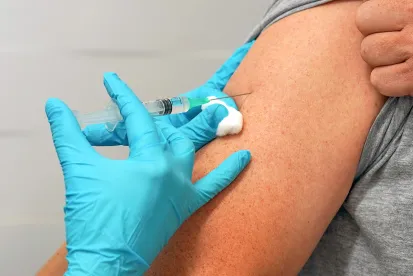Members of CMBG3’s Government Affairs and Public Relations Practice Group recently attended a presentation hosted by Massachusetts Institute of Technology’s Center for Collective Intelligence, which featured a virtual panel of vaccine and scientific experts that discussed the development of a COVID-19 vaccine. The pace at which the scientific community believes that a vaccine can be developed is crucial given the liability issues that have already arisen, and will likely continue to arise, from Covid-19 losses. The panel included Jared Silverman, Head of Translational Discovery for the Bill & Melinda Gates Medical Research Institute, Audrey Chang, Head of Process Solutions Services and Research & Development for Merck, KGaA, and David Onions, an independent vaccine safety consultant, who each offered their own unique insights on the challenges involved in developing a COVID-19 vaccine.
The panel agreed that COVID-19 presents a unique challenge for the scientific community because unlike other viruses, such as Ebola or human immunodeficiency viruses (“HIV”), COVID-19 is impacting the global population. For this reason, there is increased pressure to develop a vaccine quickly, as evidenced by daily news coverage of the pandemic.
The breadth and impact of the COVID-19 pandemic has necessarily forced different organizations within the scientific community to narrow its focus on developing ways to combat the virus. Jared Silverman explained that organizations have had to focus on different aspects of COVID-19 – some are working on a vaccine to eradicate the virus, others are working on outpatient treatments for those with mild cases of COVID-19, while still other organizations are working on hospital-based treatments for patients with severe cases. Although developing a COVID-19 vaccine is the goal for many organizations, Ms. Chang emphasized that the development of therapies to treat COVID-19 is just as important. Although there is no vaccine for HIV, we now have therapies to prevent and treat the virus. Therefore, a treatment for COVID-19 could be similarly effective in stopping the spread of the virus.
Although the public may not have foreseen the development of a global pandemic such as COVID-19, the scientific community had long believed that at some point there would be a worldwide respiratory virus. Mr. Onions noted that pandemic diseases tend to come from consumption of wild animals or destruction of conservation lands of rare animals, such as bats. When we cut down forests where rare bats live, we increase our chances of encountering these bats and contracting viruses. As a result, we are at risk of being exposed to another virus, resulting in yet another global pandemic.
The knowledge that another pandemic is a possibility has caused the scientific community to urge public and private corporations to invest in future infrastructure to be better prepared for large-scale testing to detect viruses. As Mr. Silverman stated, “there is a reason we do not fly airplanes as we build them.” Although we do not know exactly what the next virus will be, there are still efforts that we can make in setting up testing protocols and ensuring safety in manufacturing of drug treatments. It may not be easy to convince organizations to invest in pandemic-preparedness since the goal is to have it function like insurance; the investment would be in infrastructure that we hopefully never need.
Though many efforts are currently underway to develop vaccines and treatment therapies for COVID-19, we are still very early in the process, and a vaccine will likely not be ready for public-consumption, at least on a massive scale, for several months at least. Given this, liability issues arising from COVID-19 will continue to arise as companies navigate how to respond to orders governing the closures and reopening of their businesses. The scientific community’s concern that there will be another global pandemic will likely impact liability policies going forward, as those policies will almost assuredly contain broad exclusions for pandemic-related losses to cover not only losses related to COVID-19, but to cover losses related to future pandemics as well.




 />i
/>i

